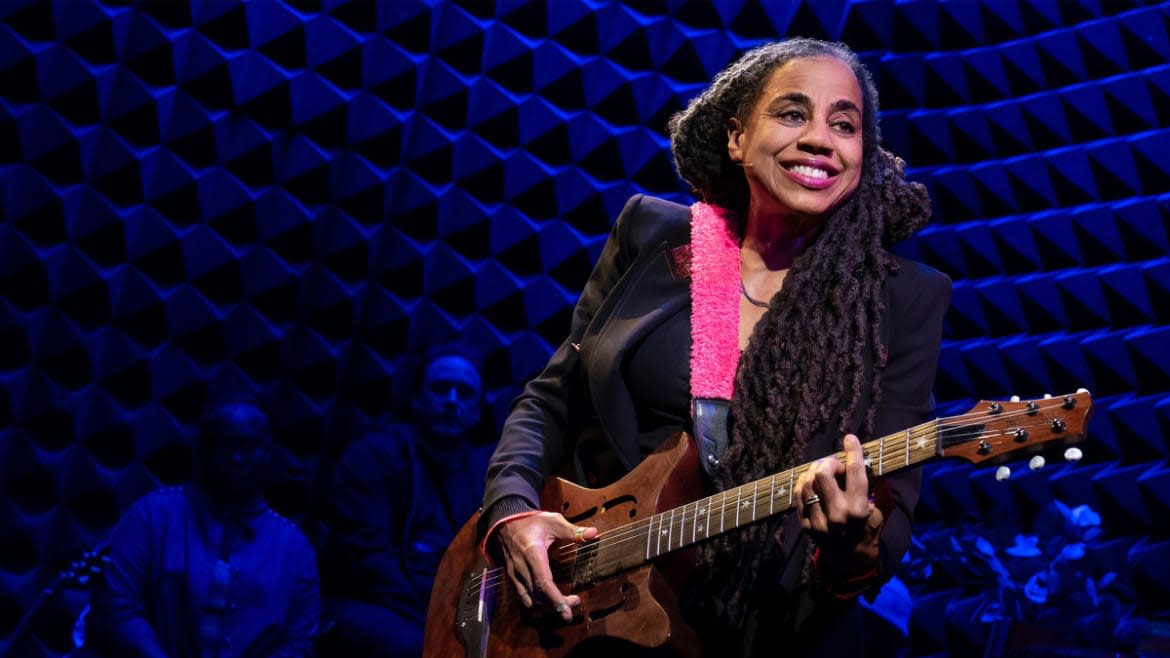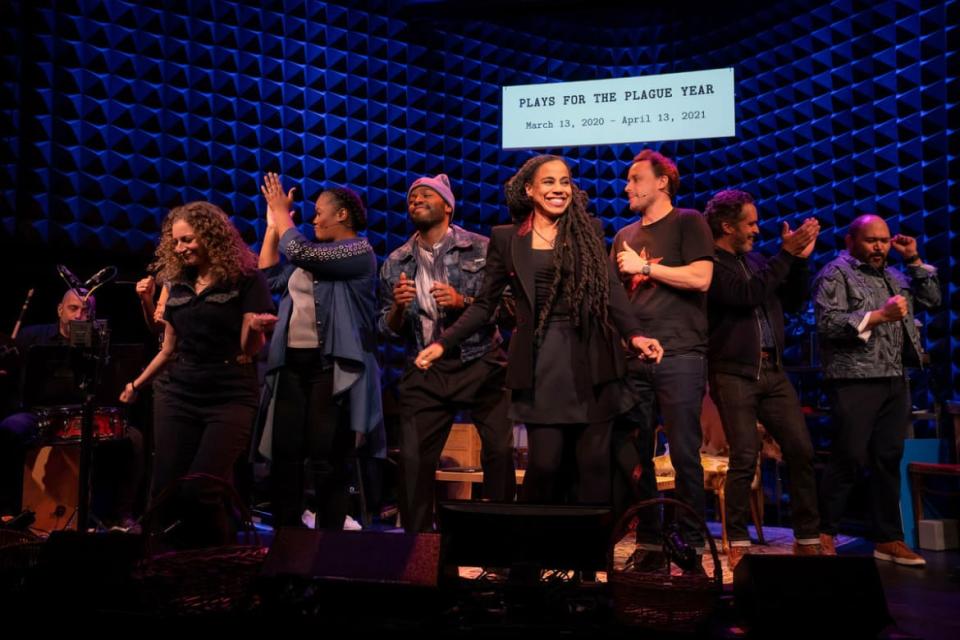Review: ‘Plays for the Plague Year’ Is Too Close for Our Comfort

- Oops!Something went wrong.Please try again later.
- Oops!Something went wrong.Please try again later.
- Oops!Something went wrong.Please try again later.
It would be one thing for Suzan-Lori Parks to have just written Plays for the Plague Year (Public Theater, to April 30), but she also performs it in a production that was initially delayed—irony alert—by the cast being struck down by COVID. Parks, the first Black woman to win the Pulitzer Prize for Drama, shares the stage with eight performers variously playing her husband, son, dear friends, the famous, cops, and colleagues—living and dead. An excellent band accompanies them.
The show is around three hours long, and takes place in The Public Theater’s Joe’s Pub. While eating fries with mayo or beet hummus may be conducive to the space’s vibe when a cabaret is playing, when watching Plays for the Plague Year a snack or cocktail may go a little more untouched. It is not material easy to chow down to.
Parks—with guitar–means the show to be an attempt to “bear witness” to what happened to her, and the world, during the pandemic. The show, she hopes, is akin to the “ghost light” in theaters—a symbol or sign that art persists whatever. She set out to write a play a day, but what we see on stage are not full-length plays, nowhere near. They are more potted moments, some from her own life with her husband and son, others inspired by big political and cultural moments. It is a pandemic pick-and-mix, a revue-style sweep through the terrible and familiar, a “banquet of the unbearable,” as Parks puts it. COVID itself is imagined as a kind of bejeweled diva, whose sheathed arms and mask you recoil from.
‘Topdog/Underdog’ Is the Sharpest Show on Broadway
Throughout there are songs, laughs, thoughts, even arguments with her muse. Plays for the Plague Year is meditative, angry, funny; you may find yourself thinking, “We went through that,” and “I remember that happening.”
We go from the killings of Ahmaud Arbery, Breonna Taylor (played by Danyel Fulton, her character hands out flowers to the audience), and George Floyd and the anger and activism that bloomed from them, to the memory of the refrigerated truck that was a morgue in Brooklyn. Signs are held aloft showing the increasing number of dead as the pandemic unfolds. Famous figures who died during that time—Larry Kramer, RBG, and John Lewis—appear. Racism, police violence, Black resistance, Black identities, and voter suppression are sketched. We hear of Trump, Biden, the election (but no Fauci).
Then there is the quotidian—the sense of victory in March 2020 of going shopping and finding toilet paper. The endless spritzes of hand sanitizer. No hugging. Social distancing. Online learning. Frozen online communications. Masks: where to find them? (Do you remember when they were impossible to find?)
Parks is determined to give voice to her thoughts, and the experiences of those rendered voiceless—which, especially if they are dead (including a doctor character), can be powerful fragments of reanimation. She rebels against the “Black Police” monitoring what she says, she seethes at the toxic nature of working in television; she notes that January 6th is not just notorious for the Trump supporters’ Capitol insurrection, but as the day she began writing the brilliant Topdog/Underdog. (Parks may be too modest to say so here, but the Broadway revival of the show last year was fantastic, and should be rewarded at this year’s Tonys, including for its stars Corey Hawkins and Yahya Abdul-Mateen).

The cast of ‘Plays for the Plague Year.’
The production speeds through the year, reminding us how concentrated and insane the news cycle was, and the effect of living through that with one’s own life in sudden upheaval. We briefly meet the friends and loved ones Parks lost, as well as how she and her family carried on with a new normal.
All the time, her own husband’s COVID-related illness worsens, while an adult actor, Leland Fowler, plays their son—wanting attention, wanting space, wanting them to be around when they are not. We see Parks go back to work on a TV set, where the “six feet” rule is regimentally imposed. All through the events that are personal to her, and the ones well-known to us through the TV news, there is the resonant sense of isolation that the pandemic introduced—a sense of fracture that still lingers.
Some stories are powerful, some are throwaway; some moments pierce, others do not. Silliness is welcomingly scattered to break up the heaviness, such a brief, nifty skit on Brits, cute family affection and backchat. The show is a bran-tub, and you wish there was more time for some things— like the effect of her husband’s illness on him, her, their family. Instead, its intense sweep of history is distilled into glancing flares of memory, and much of what Parks relates remains razor burn-sensitive to watch—depending on how your life changed, who you lost, what you lost (or gained—Parks and her husband found a happy bolthole in Atlanta), and how the cultural and political upheaval affected you.
Parks is also a commanding performer, whose love of music, wit, intelligence, and writerly foibles are all folded up in the show. We see her fighting with her muse, and wondering what the point of writing this show is. Is writing adequate to the task of encapsulating anything? The show is as much a self-interrogation of writing and the writer as it is the pandemic; given what the show covers, Parks also makes clear who and what it does not (among them: Sidney Poitier, Betty White, Daunte Wright, bell hooks).
Ultimately, Parks proposes that the crafting of the play, the fact we are here watching it, is a testament to art bringing people together. She knows how hard it may be to watch or even make sense of; it is still all too recent and too ongoing. Plays for the Plague Year is neither salve nor provocation, but a scrapbook very personal to Parks, yet recognizable to those leafing through the pages with her.
“I had this belief that theatre would save us. But it won’t. Not in the way I thought it would. But it does preserve us, somehow,” she says. That, Plays for the Plague Year proposes, is a not-insignificant something.
Get the Daily Beast's biggest scoops and scandals delivered right to your inbox. Sign up now.
Stay informed and gain unlimited access to the Daily Beast's unmatched reporting. Subscribe now.

